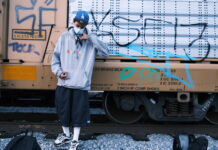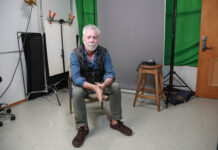Laura Corral / The Bull
It’s a Saturday night, and I find myself in a packed warehouse in Downtown LA.
There’s music of the post -punk genre blaring and the place smells of stale beer and sweat. Tattooed women in Cyndi Lauper circa 1980s attire and roller skates are gliding around. Suddenly the lights turn dim. A spotlight showcases the center of the large banked-track that’s in the middle of the warehouse.
On the track are more gals with intriguing attire, torn fishnets and skates. But they’re different from the others. They are adorned with helmets, knee pads and wrist guards. They look tougher and wear the image of determination on their faces. A 40-something man leans in towards me to tell me about his favorite skater. “See her?”, he says with a sly grin. “That’s Krissy Krash, she gives bitches stitches”.
This man and the legion of loyal fans surrounding us are here to support the Los Angeles Derby Dolls, the all-female roller derby league of Los Angeles. Roller Derby was officially created back in the 1930s by a man named Leo Seltzer. At first, derby leagues were co-ed, but Seltzer soon realized that audiences enjoyed the all-female leagues best. Fast forward 70 years and all-female roller derby is still as popular as ever. The L.A. Derby Dolls were created in April of 2003 by Rebecca “Demolicious” Ninburg and Wendy “Thora Zeen” Templeton and they have been selling out tickets for their bouts ever since.
A couple weeks following the attendance of my very first Derby Dolls bout, I once again find myself at the warehouse or as the Dolls call it, The Doll Factory. It seems so different now. There are no loud cheers from the rowdy crowd that once occupied its seats and there is no loud music playing in the background. Instead, there are echoes of conversation and the screeching sound of skates coming to a halt. For someone who’s created a team of hard hitting derby athletes, Ninburg is quite unassuming.
She has perfect blonde hair, wears black-rimmed glasses and looks more savvy businesswoman than roller derby queen. Her office is filled with derby memorabilia. On the wall hangs a large poster of “Kansas City Bomber”, the 1972 derby themed flick starring Raquel Welch.
A former sculptor, Ninburg begins to talk about her early days involving derby. ” I was sculpting and my friend was painting and she brought roller skates to work one day,” says Ninburg. “That’s when we began talking about roller derby.”
“At the time I was just sick of commercial sculpting. I was looking for more meaning,” she says. Ninburg found her remedy for more meaning in life with the idea of starting a roller derby league. “You get sick of having ideas and not following through with them, so I said, okay, I’m going to stick with this idea,” she says. ” I promised myself that and that was 7 years ago.”
The road to obtaining the popularity that the L.A. Derby Dolls have now wasn’t an easy one. Derby had hit it’s peak of popularity back in the 1970s and had pretty much died out in the 80s and 90s. Even though Ninburg and her band of aspiring derby skaters didn’t know much about derby or skating in general, that didn’t stop them from trying. ” We didn’t know how to skate or about any other leagues. I skated like anybody skates when they’re a kid, like, I could do the Hokey Pokey and let’s just say that was the limit of what I could do,” she says.
“Neither of us knew how the game was played, we went to roller rinks and started asking people about roller derby.” Ninburg was determined to bring roller derby it’s popularity back and it was at a time when few people followed the sport or even knew what it was. “I was well aware of the fact that it hadn’t manifested itself in a long time,” says Ninburg. “At a certain age you’re like, what happened to that sport? Women were equal to men, it was so bad-ass, what the hell happened to that?”, she says. ” We were like, damnit, nobody else is doing it, we should just do it.”
Ninburg, Templeton and derby enthusiasts who wished to be part of the reinvention of the sport set their sites on a place to practice their skating. ” We moved around a lot from place to place. We started on a rooftop in Chinatown, then we moved into a building,” says Ninburg. ” We skated at Skateland in Northridge and they didn’t like us,” she says. ” They would have Christian night skate and they just didn’t like who we were, they assumed we were a certain way, they didn’t realize we were civic minded,” she says. ” I think to survive in this world you have to make assessments quickly of everybody, so people get grouped and categorized.” Ninburg and her Dolls not only skate, they also participate in many community events and have even hosted a health fair. ” There used to be a preconceived notion of who we are and I don’t think we get that at all anymore,” saysNinburg. “People are taking the time to get to know who we are and I think it’s because all of the work we do in our community.”
Ninburg’s passion for derby wasn’t just about the sport itself but rather an ode to being a powerful woman. ” If you can really find what is compelling you and why I’m here is because it’s the first time in Women’s history where we have the opportunity to have our own full-contact sport. We’ve never had our own contact sport,” she says. “We’re not following the paradigm of a male sport. It’s not necessary for us to put a “W” in front of it, which inherently kind of gives it this second-class stature sport if you put a “W” in front of it.”
Derby wasn’t only just a way that women could prove to be tough, but it was also a way to blow off steam and be somebody else. One of the most unique traits of the sport is that each player gets to have their own “stage name” or persona. ” I remember as a kid roller derby skaters always had sort of a nickname. That was one thing I remembered, so it was like, ‘oh, I want a bad ass nickname’,” says Ninburg. “There’s sort of this element of this surreal world,you know, fake names, but the sport is very real”, she says. “Outside, it’s sort of a celebration of who we are, sort of like these alter-egos.” ” Like, Rebecca Ninburg, she might be a good sculptor or whatever, but she’s not a bad ass roller derby skater, you know? Demolicious is a bad ass roller derby skater,” says Ninburg,
She even credits the nickname rule as giving the skaters the inspiration to give their best out on the rink. ” It just became this thing, sort of a badge you earned here. It was, okay, you get this name and it’s something to live up to,” she says. ” It sort of frees you to become what you want.”Ninburg and her Dolls prove that you can still be a girl and be tough. ” We’re re-defining the word feminine,” she says.
“Feminine doesn’t mean demure, feminine defines being female and it can mean extremely strong, and aggressive, and beautiful, and elegant; we can be all those things.”

Rachel ?Iron Maiven? Piplica, left and Kristen ?Krissy Krash? Adolfi. (Joseph Kukuczka)

(Joe Kukuczka / The Bull)

The Dolls at a scrimmage against The San Diego Swarm, far right. (Amber-Rose Kelly / The Bull)


